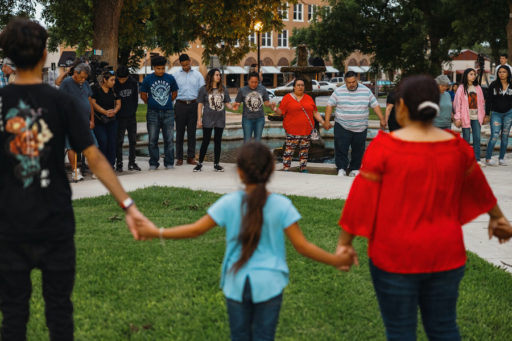After Salvador kills you, all the earth falls silent. The birds nestle their young and quiet them, our dogs tuck their tails and hide beneath furniture, the winds collapse to the ground. Waves cease their rumbling. Currents sink into the depths. All the seas become as an open and sightless eye.
In our cities, people lose interest in their shopping. Drivers park their buses, conductors step down from their trains. We parents leave our factories and fields and white-walled offices. We come home to sit in our den chairs and ponder our trembling hands. We do not turn on the television news. In the gathering dark most of us fast, and for once we don’t think about our bellies.
The littlest among us do not fast, because they don’t know what has happened to you. None of us can bear to look into their faces and tell them. We let them eat in their innocence. We urge them to eat their vegetables. So you can grow up strong, we say. Afterwards we scrape their small remains into the garbage.
In this silence, each of us can feel his own heart beating. Each of us becomes frightfully aware of what a fragile thing the heart is, and how we trust it not to stop before we are ready. In this silence, we are reminded that we are never ready. None of us, not even one. We are reminded that all have sinned and fallen short of God’s glory, that perhaps this is why we are never ready.
How quiet it is without your laughter. Without your wheedling and haranguing and foolish questions, without your pestering and giggling and griping. In this unnatural silence we realize that as the rain falls on the just and the unjust, so too does the sound of children. We realize that, just as the rain belongs to us all, so do the children, every daughter, every son.
Even him, the boy who did this to you. If any of you are ours, then surely Salvador Ramos is ours. He is our son, and we are his parents. Look what he became while we weren’t paying attention.
It’s terrible what we realize in the silence. This is why we drove it from our towns and cities in the first place. Why we sent it out onto the prairies, up beyond the hills, deep into the caverns. We drove the silence from our midst because we have an inalienable goddamned right not to be troubled.
And now, how quickly the silence has returned. Like it had its bags packed. Like it knew this day would come. The silence inhabits our homes and it seems not to care for the plans we’d made. The silence doesn’t know its place all of a sudden. Somebody ought to do something. There ought to be a law. Who put the silence in charge?
We can usually count on the politicians to dispel the silence; it’s half the reason we keep them around. They do their best now, they puff out their chests and they vomit up words but this silence is too much even for them. They sound like mice, squeaking in the basement. No, something smaller than mice. Someplace lower than a basement.
Meanwhile, the silence has settled into your empty room. It lays its head on your pillow.
We are all of us ashamed to speak. We whisper prayers in our shame and many of us weep and our young children wail at the sounds of their fathers weeping, because it is more unusual even than the silence. To the silence we offer your names as a sacrifice:
Eliahana Alexandria Jailah Amerie Nevaeh Annabell Miranda Tess Eliana Jackie Rojelio Xavier Jayce Layla Makenna Maite Alithia Jose Uziyah
But you are all so small, and the silence is so large, and your names make it larger. To your names we add those of the women who placed themselves between you and the boy with his guns—for how can we keep them from you now?
Eva, we say. Irma. Eva and Irma offered up their lives while the police dithered outside with their guns and radios and thin-blue-line stickers. See how the silence swallows the teachers with the children.
We are tempted to blame God for his absence, but we tremble at the thought of what he’s going to do when he returns. What will he say, when he sees the mess we’ve made of things? Where are my children? he will ask. Sweet Christ, who’s going to be the one to tell him?
In the hours after Salvador kills you, we question our own lives, and receive no answers worth recording. In the presence of your absence, we examine our complicity. We vow in our hearts to change, and for a time we even mean it.
Tony Woodlief is the founder of Intentional Fathering, which is devoted to helping fathers build better parenting habits, and the author of I, Citizen, a book about reclaiming American self-governance.





